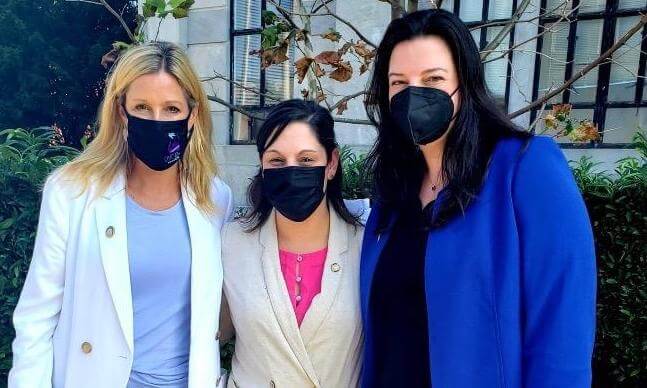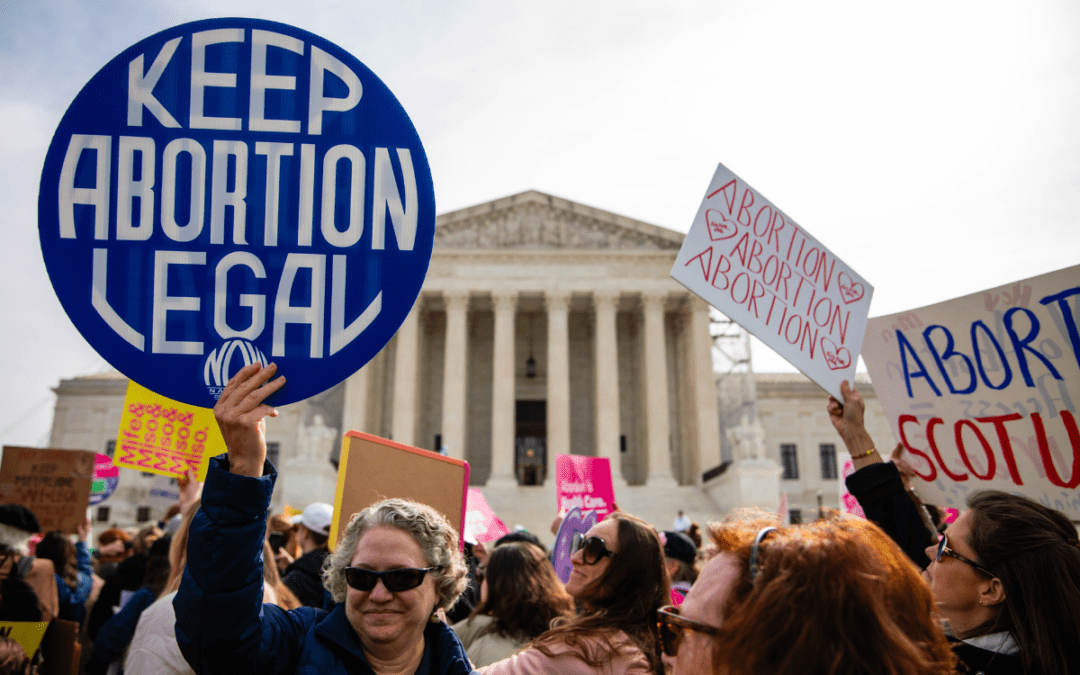
L-R: Rep. Melissa Shusterman, Sen Amanda Cappeletti, and Rep. Liz Hanbidge, outside the Montgomery County Courthouse in Norristown on Oct. 15. (Courtesy Rep. Hanbidge)
Many women silently grieve a pregnancy loss while going about their daily lives. New bill would allow working women to take time off.
HARRISBURG — New legislation would require employers to give three days of paid leave for a pregnancy loss.
State Rep. Liz Hanbidge (D-Montgomery) and state Rep. Melissa Shusterman (D-Chester) recently introduced House Bill 1977, the Pennsylvania Support Through Loss Act, which would ensure working women three days of paid time off if they lose a pregnancy.
“Loss of pregnancy is often defined as one specific moment. When in reality it can be a long and arduous series of moments,” said Shusterman while announcing this legislation. “There is no one-size-fits-all response to the loss of pregnancy. However, we must recognize that a recovery period from such an event no matter what recovery looks like, should be met with compassion and respect.”
What’s in the House Bill 1977?
HB 1977 would require employers to provide three days of paid leave in the event of:
- a lost pregnancy (miscarriage or stillbirth)
- an unsuccessful attempt at intrauterine insemination
- an unsuccessful assisted reproductive technology procedure
- a diagnosis that impacts fertility or pregnancy
- a failed surrogacy arrangement/failed adoption.
A worker could also take time off to care for a spouse or partner who experienced one of these.
Why Is It Important for People to Have Time Off After a Lost Pregnancy?
About 10 to 20% of known pregnancies end in miscarriages, according to the Mayo Clinic.
Physical recovery can take as little as a few hours or as much as several days. Planned Parenthood suggests that people avoid hard work or exercise for a few days to a week after a pregnancy loss.
Emotional recovery can take even longer. A 2019 study by the American Journal of Obstetrics and Gynecology found that 29% of women who experienced a pregnancy loss had post-traumatic stress symptoms one month after, 24% of women experienced moderate/severe anxiety, and 11% had symptoms of moderate to severe depression.
“There are women all over the country at work currently miscarrying and trying to hold that burden alone, without the resources to be able to take the time to go home and heal, or talk to counselors, or see doctors as much as they might want to or need to,” Hanbidge told The Keystone.
HB 1977 Is Personal for Hanbidge
Hanbidge first spoke on the House floor in 2019 about her experience of a miscarriage.
“It’s not something women tend to talk about,” Hanbidge said. “I never in my wildest dreams anticipated having to talk about my deeply personal issue in such a public context.”
She decided to share her story when state Rep. Frank Ryan (R-Lebanon) introduced the Final Disposition of Fetal Remains Act, which would require healthcare facilities to bury fetal remains. Because a burial requires a death certificate, any woman who had a miscarriage, stillbirth, or abortion would have to fill out a death certificate for the fetus. Hanbidge says this would cause women more shame and trauma. It would also be costly and add their information to a database of miscarriages and abortions.
Since sharing her story, Hanbidge heard from countless other women facing the same heartache.
“I felt alone and lost when it was happening to me, and now I feel less alone because I’ve had the experience of sharing this information and having it shared in return,” she said.
Other women in the Pennsylvania Legislature have shared their own pregnancy loss stories publicly, including state Reps. Maureen Madden (D-Monroe) and Leanne Krueger (D-Delaware), and state Sen. Amanda Cappelletti (D-Montgomery).
“We’ve had a lot of women very bravely have to tell their stories because of the tone and the rhetoric that we’re seeing about women’s health issues in the Pennsylvania House in particular,” Hanbidge said. “And these are stories that normally in your typical life you wouldn’t have to share and they’re tremendously burdensome to share, but when we’re talking about this legislation it’s so important that we’re hearing these women’s stories.”
Politics

How Project 2025 aims to ban abortion in Pennsylvania
Former president Donald Trump said abortion was a state’s rights issue recently, but conservative organizations, under the banner “Project 2025,”...

736,000 PA households could lose crucial help on their internet bills
Time is running out for the Affordable Connectivity Program, which provides low-cost high speed internet access for over 736,000 Pennsylvania...

What to know about Trump’s legal issues
Over the past year, former president Donald Trump has become the center of not one, not two, not three, but four criminal investigations, at both...
Local News

Conjoined twins from Berks County die at age 62
Conjoined twins Lori and George Schappell, who pursued separate careers, interests and relationships during lives that defied medical expectations,...

Railroad agrees to $600 million settlement for fiery Ohio derailment, residents fear it’s not enough
Norfolk Southern has agreed to pay $600 million in a class-action lawsuit settlement for a fiery train derailment in February 2023 in eastern Ohio,...





